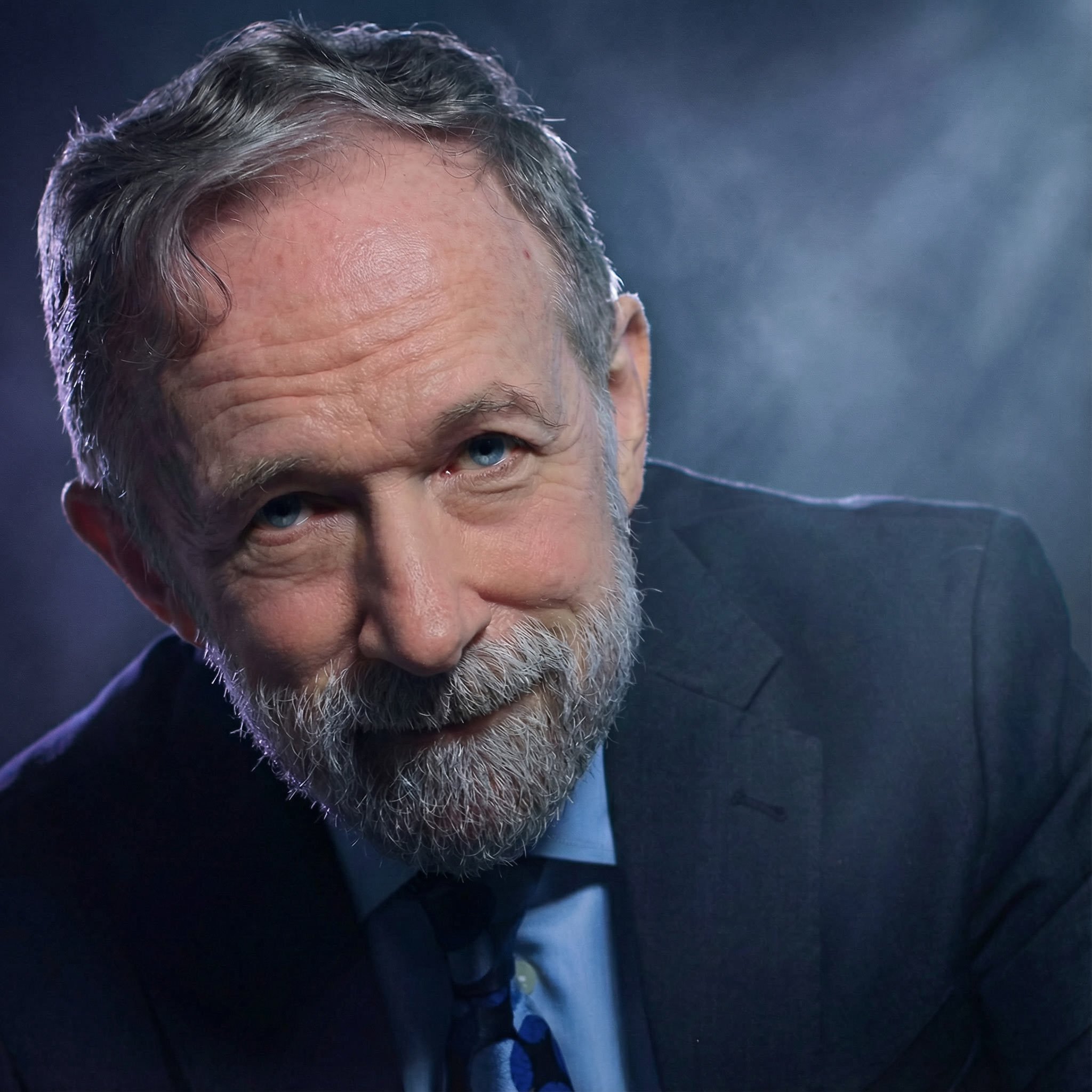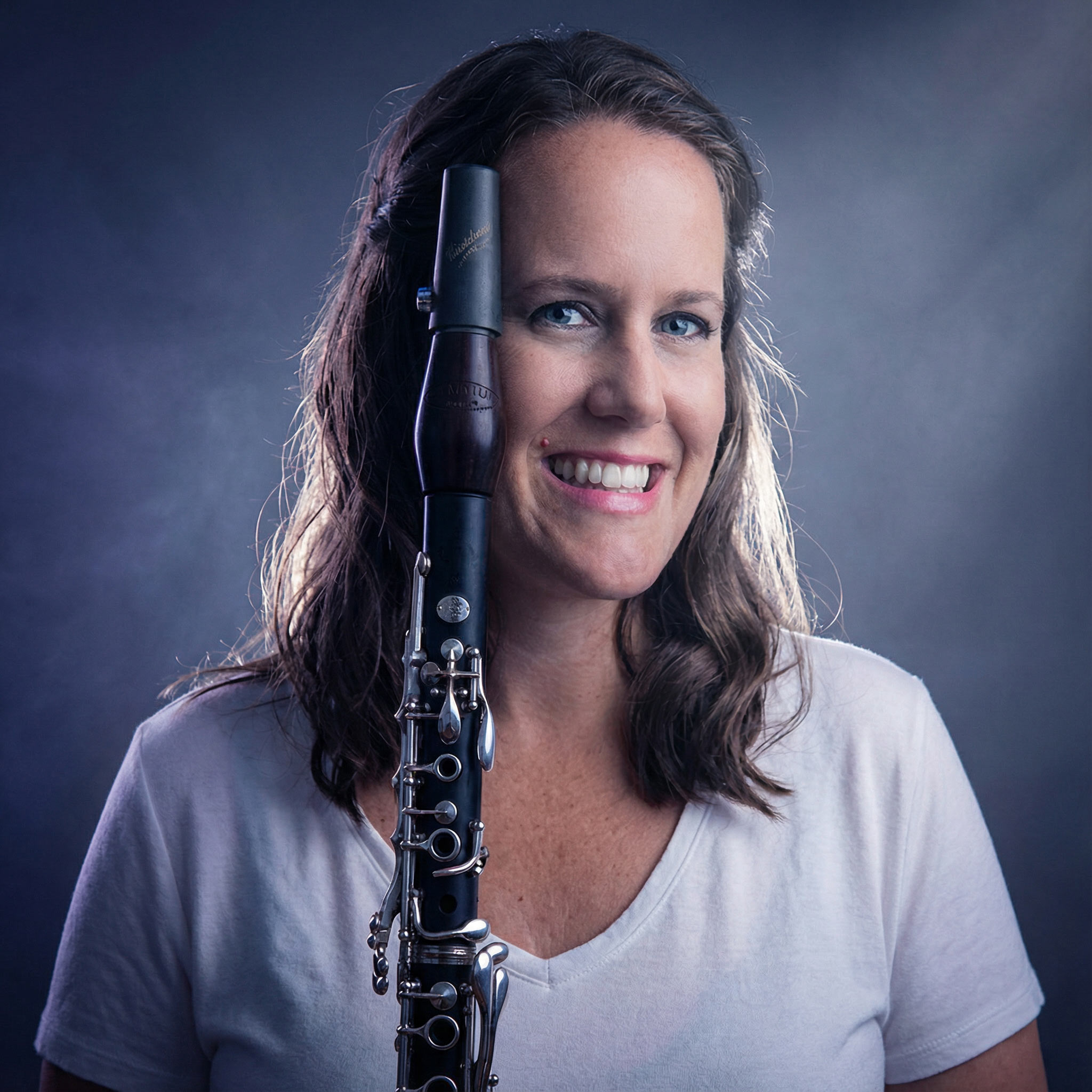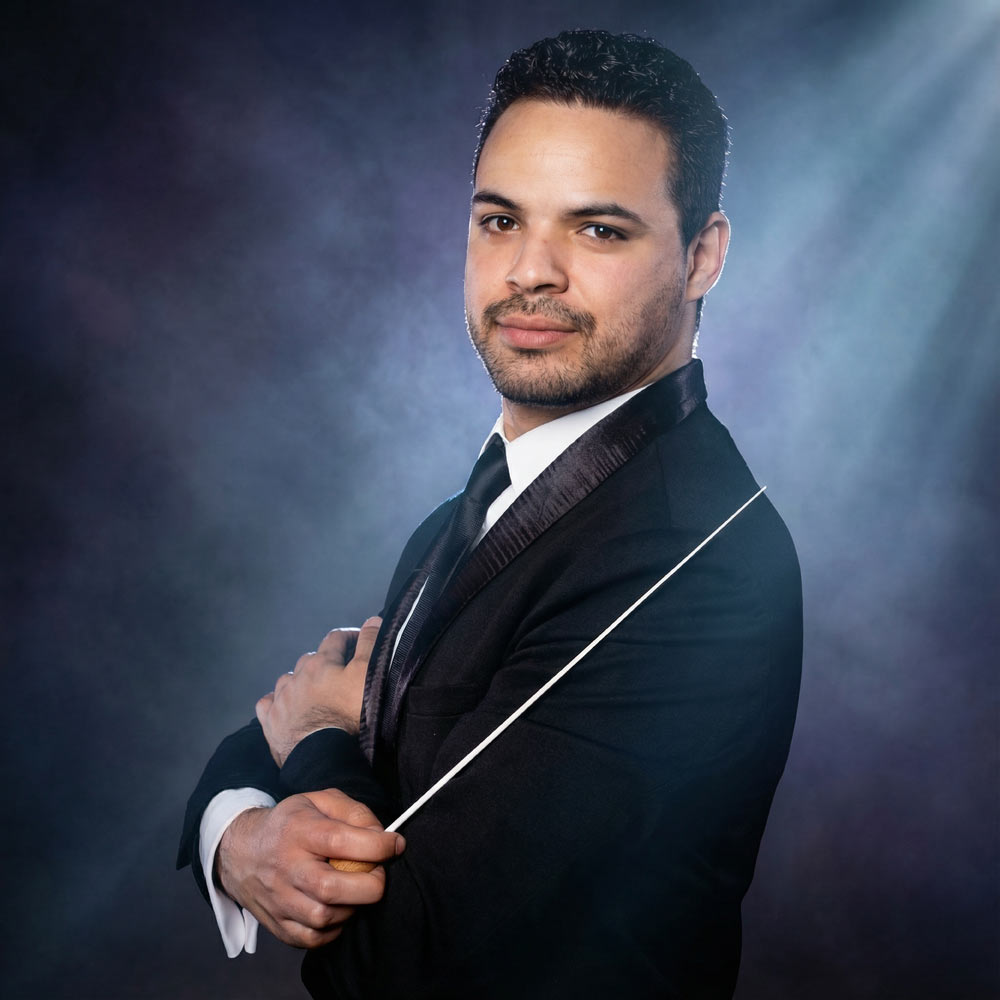January 17, 2026 7:00pm
The Scott Center at Holy Trinity - 5625 Holy Trinity Dr, Melbourne, FL 32940
VERDI Aida: Overture
LANDIS Construct WORLD PREMIERE
MARSHALL Solace WORLD PREMIERE
ROSSINI The Barber of Seville
WAGNER Die Walküre Act III: "Ride of the Valkyries"
BIZET Selections from Carmen Suites Nos. 1 & 2
ABOUT THE PROGRAM
The Space Coast Symphony Orchestra’s commitment to artistic growth, new music, and the next generation of talent is on full display in this special program. In addition to Aaron Collins at the podium, the orchestra welcomes guest conductor Andrés Rivas, who will lead several works as part of Aaron’s ongoing effort to highlight and mentor emerging conductors—an initiative that reflects the SCSO’s belief in nurturing the future of the art form alongside celebrating its greatest traditions.
The first half of the program shines a spotlight on new and contemporary voices, underscoring the orchestra’s long-standing dedication to living composers. Composer Christopher Marshall, a close collaborator of the SCSO for more than seventeen seasons, returns with Solace, a profoundly moving new work for clarinet and strings written in memory of his life partner, John Endemann. Commissioned by the SCSO and written for clarinetist Jennifer Royals, Solace traces an emotional journey from grief toward acceptance, peace, and healing—music of deep intimacy, warmth, and quiet strength.
Also featured is the World Premiere of Construct by Steven Landis, a single-movement work that depicts the life of an idea from its earliest spark to full realization. The concept is reflected not only in the evolving musical material, but also in the concert hall itself—an architectural and acoustic “construct” brought to life through sound.
After intermission, the stage belongs to you. Beginning in September, audiences were invited to help shape this concert by voting for the music they most wanted to hear as part of the SCSO’s First Annual Audience Choice Concert. The response was extraordinary—1,049 votes were cast—and the results form a thrilling celebration of operatic drama and timeless storytelling.
The journey begins with the stately grandeur of Verdi’s Overture to Aida, where shimmering strings and bold, imperial fanfares introduce sweeping themes of love and duty. The mood turns playful with the sparkling wit of Rossini’s The Barber of Seville, a whirlwind of infectious energy propelled by lively woodwinds and the famous “Rossini crescendo.” Intensity ignites with Wagner’s “Ride of the Valkyries” from Die Walküre—a blazing surge of rhythm and brass that remains one of the most electrifying moments in orchestral music. The program concludes with Bizet’s Carmen Suites Nos. 1 & 2, featuring unforgettable moments such as the “Habanera,” “Toreador Song,” and “Danse Bohème,” capturing the fiery passion, color, and drama of this enduring masterpiece.
TICKET INFORMATION
Tickets are $35 in advance for adults and available through our website or by calling (855) 252-7276. Tickets can be purchased in person at any Marine Bank & Trust location. To find a ticket outlet near you, click here. Tickets at the door are $40. All SCSO concerts are FREE for those aged 18 and under or any college student with a student ID. Discounted tickets are available for all SCSO concerts through the 'Symphony for Everyone' Program. Seats are not assigned and open.
Artist Information
![Steven-Landis-01]](https://spacecoastsymphony.org/wp-content/uploads/2025/05/Steven-Landis-01.jpg)
Steve Landis is a Part-Time Lecturer at The University of North Carolina at Greensboro and he serves as instructor of double bass and composition at the Music Academy of North Carolina. He is also a founding member and bassist of the Winnfield Quartet, a section member of The Raleigh Symphony Orchestra, and bassist for the Greensboro rock band, The Nonprofits.
Steve’s aesthetic style emphasizes extreme contrasts within the musical materials and encourages a collaborative relationship between the score and performer. His work synthesizes the craft of Western art music and the energetic DIY spirit of underground punk/metal traditions through the integration of improvisation, performance space, and environment as aspects of the composition. As a composer, Steve works with many mediums including solo instrumental, mixed chamber groups, large ensembles, digital and mixed media, and film and theater. Steven has held residencies at the Millay Colony, the Virginia Center for Creative Arts, and Wildacres Artist Retreat.
Steve earned his DMA in Composition at The University of Missouri-Kansas City Conservatory, a MM in Composition from The University of North Carolina at Greensboro, and a MM in Double Bass Performance and a BM in Composition from The University of Florida.

Christopher Marshall is a freelance composer and teacher of composition. Orlando, Florida in the United States of America has been his home since 2006. A New Zealander, born in Paris, France, he received his early music education in New South Wales, Australia and in Wellington, New Zealand. He holds a Masters Degree in Music with Honours but is largely self taught as a composer. This has allowed him to develop a consistent personal style. While his music has evolved greatly over the years, this has been a broadening and deepening process rather than any substantial change of direction. The foundation of his style is a strong belief that music is primarily a means of expressive communication with an audience. Singable, memorable melody coupled with a subtle use of the tonal harmonic system is a valuable resource. However if music is to communicate on more than an ephemeral level, especially after repeated hearings, the melodic and harmonic elements must be integrated into a convincing structure. He believes instrumentation must be part of this structure, not an afterthought.
Among the giants of the past, Bach and Brahms have had the most discernible influence on his music. Contemporary composers with whose work he feels an affinity include John Corigliano, John Tavener, John Adams and Arvo Pärt. His study of serial technique has been useful in determining the structure and texture of some of his music, and less frequently in matters of melody and harmony.
He has always been fascinated by the power and intensity of Maori chant. Over the years he has found elements of this music appearing as part of my musical vocabulary, usually on a superficial level as in certain melodic turns of phrase and in a particular choice of instrumental tone colour, but sometimes as a significant influence on the very structure of a piece. Likewise the rhythms and forms of other Polynesian music continue to make their mark. He spent three of the most inspiring – and difficult – years of his life in Western Samoa, mostly inland at Vaia’ata in Savai’i. It is not surprising therefore that this very strange and beautiful country should have left its mark on his psyche.

Jennifer Blahnik Royals, a native of Vero Beach and principal clarinetist for the Space Coast Symphony Orchestra, has been playing the clarinet for over twenty-five years. She holds a Bachelor of Music Education degree and a Master of Arts degree in Clarinet Performance from the University of Central Florida. While an undergraduate student, she was chosen for advanced clarinet studies in France. Ms. Royals has studied privately with Ivan Wansley, Keith Koons, and Nora Lee Garcia. Additionally, she has taken master classes from Stanley Drucker, Robert Spring, Michele Gingras, Alessandro Carbonare, and Charles Neidich.
Ms. Royals has played with various orchestras and ensembles including Treasure Coast Wind Ensemble, the Vero Beach Chamber Orchestra, the Sunshine Clarinet Quartet, Treasure Coast Opera, Central Florida Lyric Opera, Bulgaria's Teatro Lirico D'Europa, Orlando Light Opera, Lakeside Chamber Players, Brevard Symphony Orchestra, Haifa Symphony, Space Coast Pops Orchestra, and the Licorice Sticks Clarinet Orchestra. As a founding member of the Space Coast Symphony, she has been featured in several chamber concerts as well as four solo performances with the orchestra.
Jennifer is a member of the International Clarinet Association and has performed at the 2010 Clarinet Fest in Austin, Texas, the 2013 Clarinet Fest in Assisi, Italy (where she premiered new pieces for clarinet quartet), the 2014 Clarinet Fest in Baton Rouge, Louisiana, and will be performing at the 2017 Clarinet Fest in Orlando.
In addition to her active concert schedule, Royals is a sought after clinician who provides private clarinet instruction to middle and high school players in Indian River County. Her students routinely earn top seats in the Florida All-State.

Born in Caracas, Venezuela, in 1990, Andrés Rivas began his musical training at the age of three at the Centro Académico Montalbán, part of Venezuela’s internationally recognized El Sistema de Orquestas Juveniles e Infantiles. His early immersion in El Sistema shaped a career that seamlessly integrates violin performance, orchestral conducting, and a deep commitment to music as a social force.
Mr. Rivas made his international conducting debut in 2010 at Ewha Womans University in Seoul, South Korea. In 2011, he was personally invited by Maestro Gustavo Dudamel to conduct at the inauguration of Venezuela’s National Center for Social Action for Music and the 36th anniversary of El Sistema. That same year, he shared the podium with Maestro Dudamel in a tribute concert honoring composer Juan Vicente Torrealba, conducting Concierto a Caracas and Suite Torrealbera, and later conducted at the Casa da Música in Porto, Portugal.
As a violinist, Mr. Rivas has collaborated with leading artists such as Martha Argerich, Gautier and Renaud Capuçon, Ilya Gringolts, Gabriela Montero, Andreas Ottensamer, and Albert Markov, performing under the baton of distinguished conductors including Claudio Abbado, Sir Simon Rattle, Gustavo Dudamel, Esa-Pekka Salonen, JoAnn Falletta, Leon Botstein, and John Williams. Since 2008, he has toured extensively with the Simón Bolívar Symphony Orchestra of Venezuela, appearing throughout Europe, Asia, and the Americas, and made his Vienna conducting debut at the Konzerthaus in 2012.
Mr. Rivas completed graduate studies in orchestral conducting at Bard College under Harold Farberman, serving as Assistant Conductor for the Bard Music Festival. In recognition of his artistic potential, he was later selected as the sole candidate for the MMus/MA in Orchestra Conducting program at the Royal Conservatoire of Scotland. In 2018, he was awarded the Miami Symphony Orchestra Conducting Fellowship, and in 2023 served as a cover conductor for the New Jersey Symphony Orchestra at the request of Music Director Xian Zhang, while also being named a finalist for the Colton Conducting Fellowship.
He has appeared as concertmaster and guest conductor at major venues including Carnegie Hall, Alice Tully Hall, Jazz at Lincoln Center, the Metropolitan Museum of Art, the Wiener Musikverein, the Berliner Philharmonie, and the National Centre for the Performing Arts in Beijing. Deeply committed to music’s social impact, Mr. Rivas has organized benefit concerts supporting communities in Venezuela, Puerto Rico, Ukraine, and beyond. Since January 2025, he has been based in Orlando, Florida, where he actively pursues new professional opportunities while maintaining national and international engagements.

